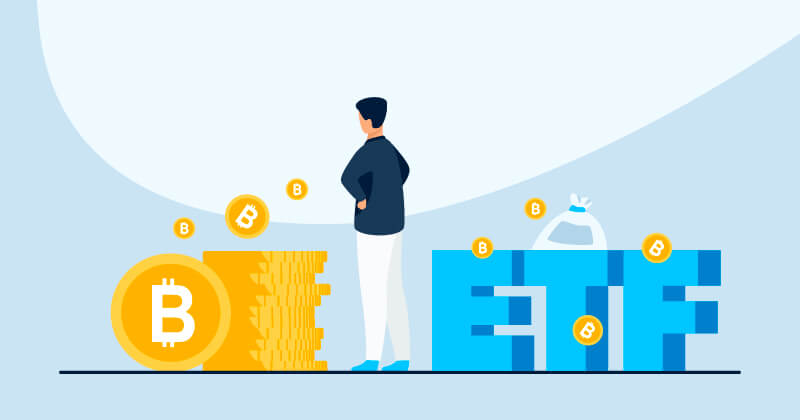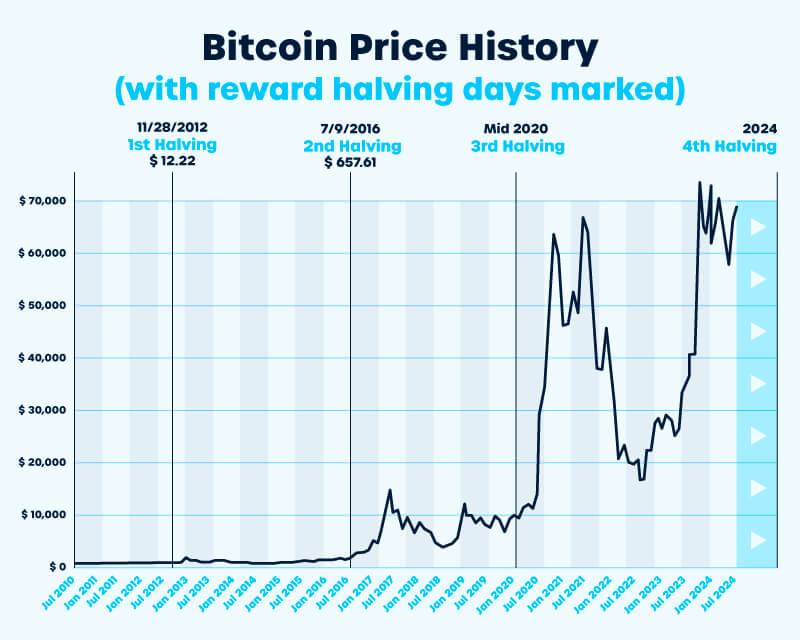

Key Takeaways
- Bitcoin ETFs provide an easy and secure way for investors to gain exposure to Bitcoin.
- Holding BTC offers unique advantages, including true ownership and the ability to use Bitcoin for transactions.
What’s better: Bitcoin ETF or Bitcoin?
.jpeg)
The choice between investing in a Bitcoin ETF or BTC boils down to your own personal preferences.
You should buy a Bitcoin ETF if:
- You want an easy way to enter the crypto market.
- You’re not comfortable managing BTC directly.
- You want to hold Bitcoin in your retirement account (and you don’t want to use a self-directed IRA).
- You don’t plan to use BTC for transactions.
You should buy Bitcoin if:
- You value decentralization and direct control over your wealth.
- You want to use BTC for transactions.
- You feel comfortable storing and managing your BTC.
- You don’t want to pay annual fees (usually less than 0.5%) for holding a Bitcoin ETF.
What’s the difference between owning Bitcoin and owning a Bitcoin ETF?
Owning a share of a Bitcoin ETF is not the same as owning Bitcoin. Let’s walk through the differences.
Owning Bitcoin directly: When you own Bitcoin directly, you hold the actual cryptocurrency, which can be stored in a secure digital wallet and used for transactions.
Owning Bitcoin ETF: When you buy a Bitcoin ETF, you hold shares in a fund that tracks the price of Bitcoin. However, you do not have ownership of BTC.
Is owning a Bitcoin ETF the same as owning Bitcoin?
Owning a Bitcoin ETF is not the same as owning Bitcoin directly.
The Bitcoin ETF is designed to track the price of BTC — so you will likely benefit from the price appreciation of Bitcoin no matter which option you choose.

However, there are some other key differences between owning shares of the Bitcoin ETF and owning Bitcoin directly.
What are the advantages of the Bitcoin ETF?
- Familiar environment: Bitcoin ETFs are traded on traditional stock exchanges, offering a familiar environment for investors.
- Ease of Access: Many investors are not comfortable navigating the digital asset ecosystem and being responsible for the security of their BTC. Bitcoin ETFs make it possible to enter the world of crypto through your standard brokerage account.
- Tax Efficiency: Most IRA and 401k providers allow you to hold Bitcoin ETFs, but do not allow you to hold BTC. That means Bitcoin ETFs are a great option for investors who want exposure to Bitcoin in their retirement accounts.
What are the advantages of owning Bitcoin directly?
- Independence from Traditional Finance: For many investors, part of the appeal of Bitcoin is turning away from the traditional banking system. Some BTC investors see Bitcoin ETFs as a betrayal of their values, since ETFs are provided by traditional financial institutions.
- No intermediary: “Not your keys, not your crypto” is a popular motto in the cryptocurrency world. This phrase is meant to emphasize the fact that if your Bitcoin is held by a third-party (like an ETF), it can potentially be taken away due to external events outside of your control — such as regulatory changes or a hack.
- Potential for Use in Transactions: Bitcoin can be used as a medium of exchange for goods and services, which is not possible with ETFs.
- No fees: Unlike Bitcoin ETFs, there are no annual fees when you own BTC directly.
- Self-directed IRAs: While most IRA providers do not support BTC, it’s important to note that you can hold Bitcoin directly in self-directed IRAs that support alternative assets.
Robert Kiyosaki on Bitcoin vs. Bitcoin ETF
To better understand how prominent investors see Bitcoin vs. Bitcoin ETF, let’s look at a quote from personal finance guru Robert Kiyosaki — the author of Rich Dad, Poor Dad.
No. Just as I own gold and silver coins and mines and own apartment houses, I do not own gold or silver ETFs or REITs, real estate ETFs. ETFs are best for most people and institutions. Personally, I am an entrepreneur and prefer to stay as far away from Wall Street’s financial products as possible.”
Kiyosaki has often emphasized the importance of direct ownership over Bitcoin and other assets.
Kiyosaki has also said that Bitcoin gives investors true control over their wealth, and has stated that he does not trust traditional financial institutions to act for the benefit of ordinary investors.
Bitcoin security: Best practices
If you plan to hold your Bitcoin directly, you are responsible for keeping your BTC secure. Let’s walk through a few steps you can take to keep your Bitcoin safe:
- Keep your private keys & recovery phrase safe: There are two things every BTC investor needs to keep safe: their private key and their recovery phrase. Your private keys are essentially your ‘password’ for your wallet, while your recovery phrase can be used to regain access to your wallet if you ever lose your private keys. Make sure to write down both your keys and recovery phrase, then store them in a secure place.
- Use a cold wallet: Cold wallets (also known as hardware wallets) store your private keys offline to keep your BTC safe from hacks. Popular BTC cold wallets include Ledger and Trezor.
- Beware of phishing scams: Be cautious of emails or websites that request personal information. In the past, these types of phishing scams have been used to scam BTC investors.
Conclusion
Choosing between Bitcoin and Bitcoin ETFs depends on your unique investment goals and preferences.
While Bitcoin ETFs offer convenience, Bitcoin offers direct ownership and a chance to be part of the decentralized economy.
Both Bitcoin and the Bitcoin ETF offer a fantastic way to diversify your portfolio and benefit from the world’s most popular digital currency.
Frequently asked questions
How we reviewed this article
All CoinLedger articles go through a rigorous review process before publication. Learn more about the CoinLedger Editorial Process.

CoinLedger has strict sourcing guidelines for our content. Our content is based on direct interviews with tax experts, guidance from tax agencies, and articles from reputable news outlets.




























%20(1).png)





.png)
















